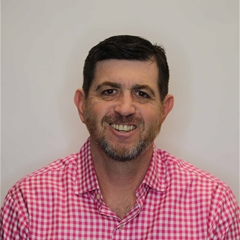 Bill Browning is the Director of Procurement at Carbonite. He has 15-plus year track record of driving cost savings and efficiencies through effective sourcing, negotiation and vendor management strategies. At Carbonite, Bill oversees the management of over $120M across all indirect spend categories as he continues to design and build out the newly-established Procurement function that now also includes the recently acquired Webroot. We are happy to welcome him to Boston this October 29 and 30 where he will share his procurement knowledge at CPO Rising 2019. The following is a conversation between me and Bill that has been edited for brevity and clarity.
Bill Browning is the Director of Procurement at Carbonite. He has 15-plus year track record of driving cost savings and efficiencies through effective sourcing, negotiation and vendor management strategies. At Carbonite, Bill oversees the management of over $120M across all indirect spend categories as he continues to design and build out the newly-established Procurement function that now also includes the recently acquired Webroot. We are happy to welcome him to Boston this October 29 and 30 where he will share his procurement knowledge at CPO Rising 2019. The following is a conversation between me and Bill that has been edited for brevity and clarity.
Matthew York: Tell us a bit about your background, as in your education and early procurement career.
Bill Browning: I have a Bachelor’s degree in biology from the University of California, San Diego, a Master’s degree in Education, and an M.B.A. from Boston University. After I moved to Boston I eventually I got into coaching (I played baseball in college), which was my first foray into “corporate” or structured buying. When I was an assistant softball coach at BU, I was in charge of our budget, travel arrangements, and buying our equipment. My job was to ensure that we stuck to a strict budget so that our dollars would last as long as possible. So, that was my first exposure to buying and procurement – not even knowing what procurement was. I then moved to the university’s budget office where I helped the different schools and colleges at BU manage their budgets. I also went back to school to get my MBA.
Right after graduating business school, I became the capital budget analyst at Massachusetts General Hospital where I was in charge of all capital expenditures. And that’s when the procurement wheel started to turn for me. When capital budget requests came through, like when MGH started building the Yawkey ambulatory center, I had to ask questions, like “Why this equipment? When do you need it by? Who else did you check with? Does this have to come from this vendor? How can we make this budget work for you in the long run?” So, that’s where procurement really solidified for me.
Shortly after finishing my MBA, I got into consulting with a company whose whole focus was public-sector procurement (state and municipal government). That was really where I understood what procurement is and what it does, and how it can impact things; and, that it’s a formal career path that I could follow and figure out where I wanted to go.
Over the past 15 years, I’ve been on the consulting, corporate, and analyst sides, where I learned the operational aspect of procurement, how technology enables procurement, and what comprises a Best-in-Class team. It’s fascinated me as I’ve seen different stages of it throughout my career. It’s also gotten me to where I am now: trying to build out a procurement organization at Carbonite, trying to figure out what the scope is and what my company needs (particularly as we organically grow and acquire other companies), and understand what it means to have a procurement organization.
MY: Tell us what’s going on in your world today – what is your team focused on?
BB: We’re focused on building out the procurement team here at Carbonite. As we continue to grow and acquire other companies, like Webroot, it presents challenges in terms of what the other company does, especially considering that the procurement organization is still just me. We’re still able to manage the spend that we have, but it’s not without its challenges. So in the next six-to-twelve months, we’ll be focused on building out the procurement team and infrastructure, assessing what procurement means for Carbonite, and reassessing what we want it to mean (especially with the last acquisition wherein we doubled in size). So we’re still addressing some basic questions, like “How centralized do we want it to be? Do we want it to be center-led and give more autonomy to the stakeholders?” We’re evaluating our financial ERP options, and one of those considerations is going to have to be procurement.
MY: What are some other challenges?
BB: I think the biggest challenge, overall, is change management. Carbonite is still a fairly small, entrepreneurial company, even after the acquisition. Our revenues are in the $500 million range; we’re not a large company by any means, but we’re still looking at $200 million in spend at that level. It’s not unmanageable with a small or very streamlined team. But as a result of the previous acquisitions, and only being a public company now for five years, we’re still trying to get into the public stakeholder type of model where we really need to figure out how to tighten things up.
Change management is probably my first, second, and third challenge in terms of getting different stakeholders on board. Everyone’s on board to varying degrees: some bring me further upstream in terms of working the process and strategies, but there are others where I don’t get full visibility until the contract is submitted. That’s the biggest hurdle – figuring out how to make that change, how to get people within the organization to change, and how to do it myself. Another big challenge is figuring out the optimal time to expand a team or even just to create one.
MY: All that said, what are some of the opportunities for the profession moving forward?
BB: I think there are a lot. Procurement is becoming more and more of a profession every year. You see companies adding procurement functions, or trying to expand the scope of their functions. That’s always good to see. I think, especially in the last few years, there’s been an explosion of tools that are sometimes embedded in, or sometimes supplemental to the traditional spend analytics, sourcing, contract management tools – the ways that software companies are trying to leverage artificial intelligence to hone in on better data, or provide fresh viewpoints of the data (especially on things like diversity spend, tail spend, etc.). I think pushing the boundaries is going to be great going forward, but it all comes back to it being a data-focused function. Without good data, you won’t be able to produce good results; or if you are, it’ll take a lot more heavy lifting to get there.
Within procurement organizations, I think there’s more of a focus on developing and retaining talent, and when necessary, letting that talent leave for other functions, because they have good analytic capabilities or they’re good leaders. So, I think that’s a good sign as well for the procurement profession.
MY: What advice would you give other procurement leaders that are starting to go through the building or expansion process with their teams?
BB: One of the big things is to come in with a plan and a few ways to prove out your plan. This can be difficult from a procurement perspective when you’re asked to be streamlined; and you’re asked to bring savings into the door that you can justify reinvesting (e.g., by bringing in x-more people, you can add can x-savings or exponential value). But I think you have to look at all different aspects that could drive efficiencies, like card programs and different types of management programs, and be willing to dig in and figure out what might make sense.
I also think that soft skills are really critical, like being able to communicate. If you have the resources, figure out some of the organization’s priorities, try to embed or align yourselves with those groups (e.g., HR, IT, Marketing). Dig in, understand their business, and be able to have that back and forth so that you can become their trusted advisor or the person/group that is looked to when it comes to a procurement matters. This could be sourcing, contracts, leading a negotiation, or even sitting in the background and helping to form the strategy for that negotiation. There are all kinds of service models, but it starts with communication and trying to understand the business of your partners – not just your company’s business, but your partners’ specific business needs.
MY: Thanks so much, Bill – this has been great. Looking forward to seeing you in October at CPO Rising 2019.
BB: Likewise, Matt.
RELATED ARTICLES
Now Accepting Nominations for “CPO Honors 2019″
The CPO Rising 2019 Summit – Get the Lowest Pricing to the Event!
CPO Rising 2019 Speaker Profile – Greg Tennyson, Head of Global Corporate Services, VSP Global


